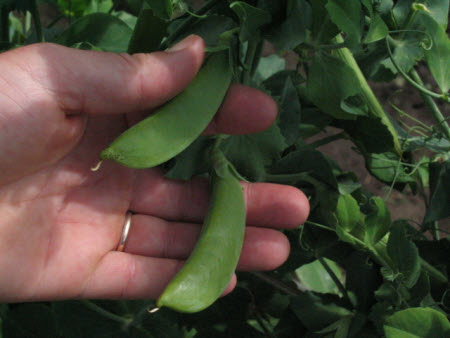
Editor’s note: We’re pleased to have Les and Jane Oke join sustainablog’s team of contributors! Off-grid since 1993, the Okes have worked in a variety of fields, including renewable energy installation, organic market gardening, and print and online publishing. They’re writers first and foremost, though, and have published articles at Mother Earth News, Reader’s Digest, Outdoor Canada, Backhome, and a host of other publications.
The walk out to our garden is always pleasant, one we always looked forward to when we began living off the grid. To find the time to be able to work in the garden was always a challenge before we moved to our present home. After work, after school, after, after, it was always secondary. Now, the garden has taken on a more secure place in our environment and our lives.
Our garden has now become much more. It is a magnet for every wild animal in the vicinity and for good reason… we have planted a border of clover to stop them at the edge, and it works (most of the time). We play a bit of hide and seek with the deer, hiding the broccoli in the corn patch so that we get some too. It usually has time to mature then.
Early mornings are the best times for wildlife viewing – deer, bear, wild turkeys, and even the occasional moose all stop by. They appreciate the nutritional quality of the food grown there as much as we do, from compost to mulch, to lime and extra organic material contributed by our “working chickens.” It is funny to see a couple deer grazing right beside the portable hoop coop that we use… funny and exciting at the same time.
Work in the garden is no longer work anymore. Rather than hurrying to fit time in to grow some fresh vegetables, it has become an integral part of our summer days, and it seems an integral part of the wild scenery too.
Off-Grid Living and Gardening: Build It Once, Reap the Benefits Forever
It did not come easy though… living off the grid was a lot of work in the beginning, but once you embrace the theory of ‘build it once, and reap the benefits forever’ it really becomes worthwhile… especially once you get to the benefit side of the equation: fresh asparagus that took 4 years to grow to the point where we can now harvest it, perennial herb beds planted only once, rhubarb, strawberries, and raspberries to name a few. It is hard waiting, but worth it.

The same can be said for composting: adding nutrients to your soil may seem like a whole lot of work but not much benefit, until you start to see the yields increase and the slow progression of your health improving as well.
Nothing easy is ever worthwhile, and nothing worthwhile is ever easy. We pay with time, we pay with sweat, but we always aim to do these jobs only once. You would not want to rebuild your home every few years? You want it to last. The same can be said about any worthwhile human-engineered endeavor, especially where it concerns the food we eat.
Go to the grocery store and buy any vegetable that you grow in your own garden. Compare the two. After eating from our garden nearly all year now, we really notice the difference. And it is not just taste either: no matter how ‘organic’ or ‘natural’ the store claims the food to be, if it is mass produced and shipped in, it is inferior to what you can grow yourself. Even produce from the root cellar in March is better.
Jane and I have become accustomed to our environment, and we work within it as best we can. Now that environment has invited us in to join it: every day we share, we enjoy, and we live. Anything is possible living off the grid.
To learn more, you can find us at Living Off The Grid
Ready to start your own garden (whether your on- or off-grid)? We’ve got plenty of green gardening supplies listed in our product comparison engine, including rain barrels, drip irrigation systems, and seeds.
Image credits: Les and Jane Oke


Kirsten Curley
I was in my garden earlier this evening thing to figure out what I’m going to do with ever expanding grape vines and raspberry bushes. I planted them both seven years ago when I moved into my house. Slowly over the years the plants have grown and are producing more fruit. I am not a patient person but my experience cultivating these plants has been well worth it.
ctedconley
I love what u are doing. You can use the wild game that enters you garden for food, bait and what is left over u put back in the garden. I think there will be a big problem with water soon to come and this will be something to over come. when u have 100,000,000,000,149 people, per 1,000,000 some odd mile every where u look food and water will have more clout then money or oil or gold. but if u had one thing too pick from what would u pick?